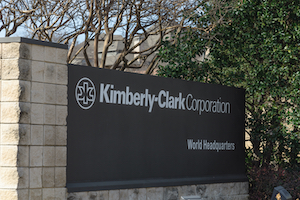 Alleging that “…Defendants did not engage in any objectively reasonable and/or prudent efforts when paying fees for RPS to covered service providers…,” a $4 billion plan finds itself in the litigation crosshairs.
Alleging that “…Defendants did not engage in any objectively reasonable and/or prudent efforts when paying fees for RPS to covered service providers…,” a $4 billion plan finds itself in the litigation crosshairs.
This time the target is the Kimberly Clark Corporation 401(k) and Profit Sharing Plan, which finds its practices challenged by two participants —Christina C. Seidner and Jared Mackrory—who allege a variety of fiduciary “sins,” but primarily for paying higher fees ($78/participant) than what was paid by what they claim are comparable plans (about $30/participant), at least based on their size.
The suit (Seidner v. Kimberly-Clark Corp., N.D. Tex., No. 3:21-cv-00867, complaint 4/15/21)—filed on behalf of the aforenamed participants by Walcheske & Luzi LLC and Kendall Law Group PLLC—is short in length (36 pages)—and substance of specific allegations—and (relatively) long on assumptions and presumptions.
The suit even appears to create a “new” category, referring to “Prudent Plan Fiduciaries” as a formal, capitalized title. According to the suit, those “Prudent Plan Fiduciaries ensure they are paying only reasonable fees for RPS (retirement plan services) by soliciting competitive bids from other service providers to perform the same services currently being provided to the Plan”—which the suit states “…is not a difficult or complex process and is performed regularly by prudent Plan Fiduciaries.” Indeed, it claims that “Plan Fiduciaries need only request a bid from salespeople at other service providers,” and that “for Plans with as many participants as Defendants’ Plan, some RPSP would require only the number of participants while others might require only the number of participants and the amount of the assets to provide a quote.”
Yes, because that’s all you need to know about bidding on a $4 billion 401(k) plan, right?
‘Switch’ Claims
Without citation, the plaintiffs claim that “more than 30,000 plan fiduciaries switch RPSP every Year,” that “all RPSP have dedicated teams to assist plan fiduciaries through the process,” and that “there are no additional transition/conversion fees charged by the new provider for large plans such as the Plan.”
The plaintiffs state as fact that the plan fiduciaries “failed to regularly monitor the Plan’s RPS fees paid to covered service providers” and that they “…knew or should have known that they must regularly solicit quotes and/or competitive bids from covered service providers, including but not limited to its primary RPSP, to avoid paying objectively unreasonable fees for RPS services.” The plaintiffs also allege that “…unlike a hypothetical prudent Fiduciary, Defendants did not have a process in place to ensure that the Plan paid no more than a competitive reasonable fee for RPS”—but then offer an alternative argument, specifically that “…to the extent there was a process in place that was followed by Defendants, it was done so ineffectively given the objectively unreasonable fees paid for RPS.”
Additionally, without any real substantiation, the plaintiffs also claim that an analysis of the plan’s 5500 forms “…reveals an inexplicable combination of duplicative service providers receiving excessive and unreasonable fees while Plan Participants did not receive any extra value to warrant the excessive and unreasonable fees.”
Oddly—considering that the table of service providers (and roles) listed in the suit appear to provide separate and distinct services—the suit charges that, “Instead of relying on a single retirement plan service provider,” Kimberly-Clark allegedly “cobbled together services from many providers,” which the plaintiffs claim “often leads to a duplication of services and higher fees with no additional benefit.”
The plaintiffs here also make an unusual assertion in this type litigation—that “prudent plan fiduciaries recognize that any difficulty or inconvenience to the plan sponsor in the context of switching to a new RPSP is not an appropriate consideration for a plan fiduciary acting for the exclusive interest of plan participants.”
The Bottom Line
Ultimately, taking the allegations as valid, their assessment as complete, and their math as accurate, the plaintiffs claim that, from 2015 to 2019 (“…based upon the best publicly available information, which was equally or even more easily available to Defendants during the Class Period”):
- the plan cost participantson average approximately $838,734 per year in RPS fees, which equates to on average approximately $48 per participant per year; and
- compared to other plans of similar sizes with similar amounts of money under management, the plan actually cost its Participants approximately $4,193,670 in unreasonable and excessive RPS fees—or (when accounting for compounding percentages) a total, cumulative amount in excess of $6,273,391 in RPS fees.
What This Means
This is not this firm’s first “crack” at a large ERISA plan, having filed suit against the $4.2 billion, 39,000 participant Nestle 401(k) Savings Plan last fall and the $15 billion Costco 401(k) plan the preceding June. In that sense, they are definitely “swinging for the fences” in terms of targeting extraordinarily large plans—and likely big wins or big cash settlements—for litigation.
One hopes, however, that it would take more than these types of cursory allegations to warrant the time and attention of a court, much less that of a “Prudent Plan Fiduciary.”
NOTE: In litigation there are always (at least) two sides to every story. However factual it may turn out to be, the initial lawsuit in any action is only one side, and one generally crafted toward a particular result. In our coverage you'll see descriptions of events qualified with statements such as “the suit says,” or “the plaintiffs allege”—and qualifiers should serve as a reminder of that reality.

